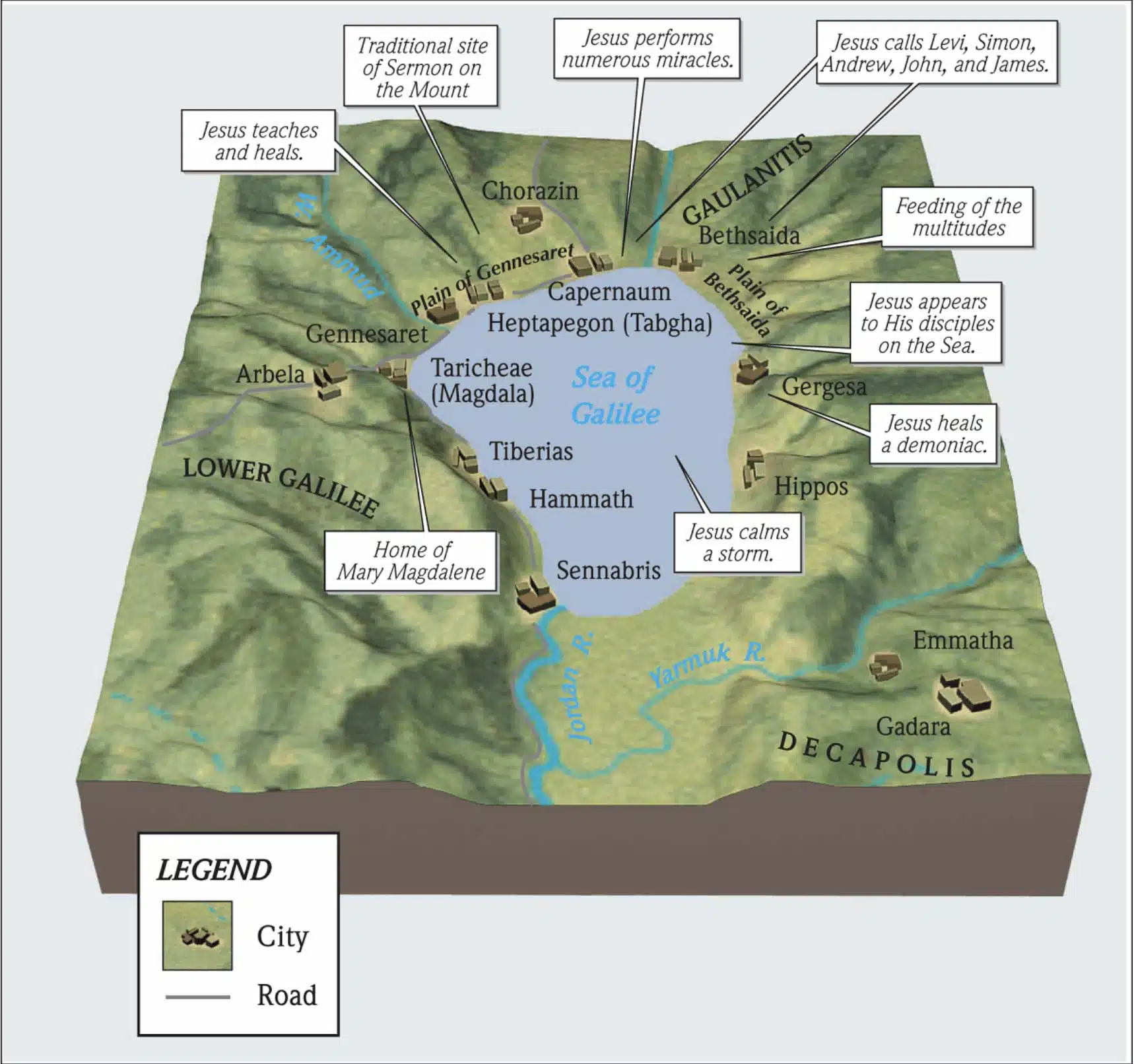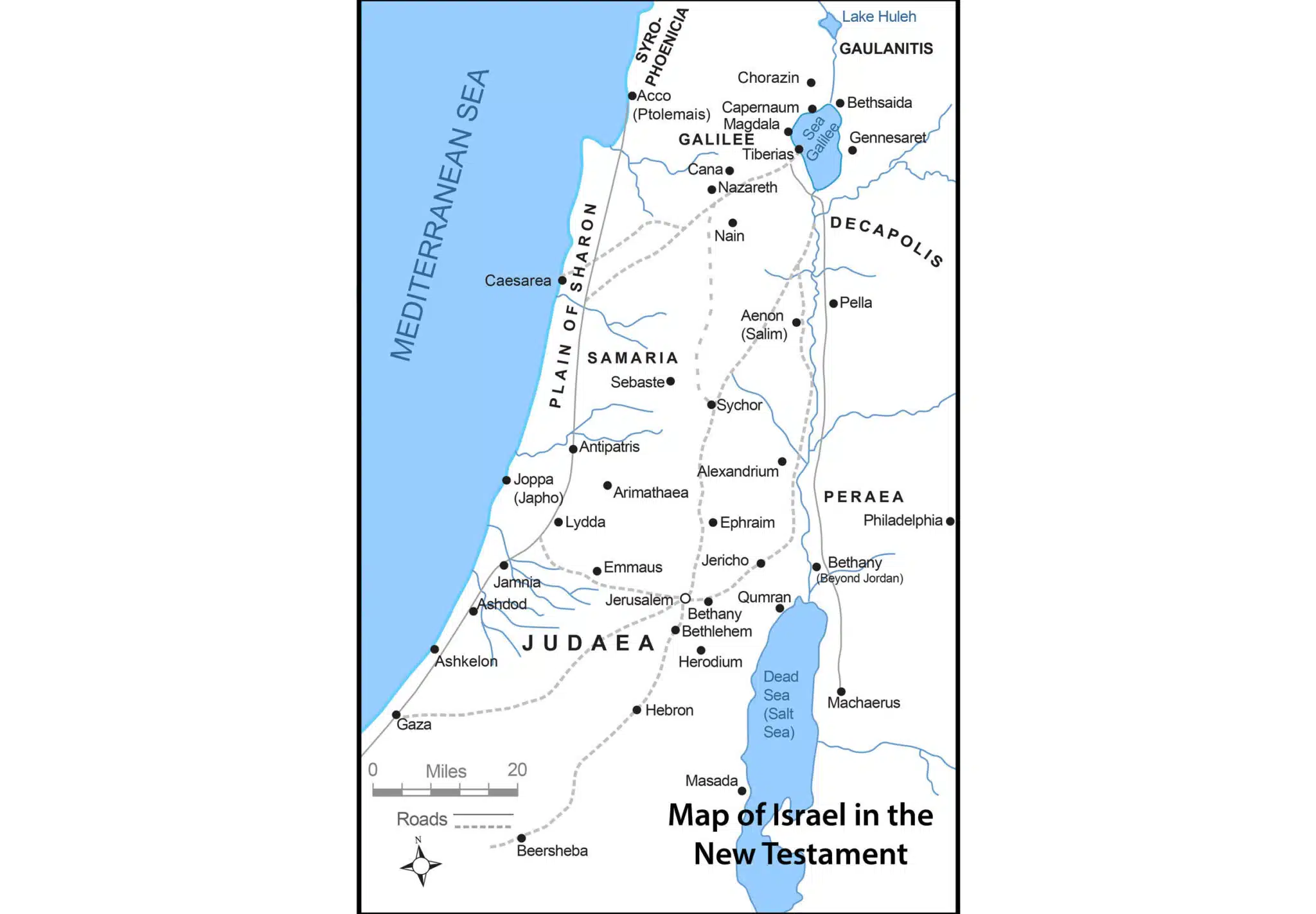The Parable of the Sheep and the Goats: “The Closing Remark.”
Jesus concludes His teaching about the Judgments regarding the Sheep and the Goats with a short summary statement. He explains that the goats will go into the eternal fire while the sheep will go into eternal life. This also concludes His teachings about the end of the age and His return in the Olivet Discourse.
This parable has no apparent parallel in the other gospel accounts.
TheBibleSays commentary has subdivided the parable of the Sheep and the Goats and its subsequent elaboration (Matthew 25:31-46) according to the outline below. To better facilitate continuity and cohesion, the entire passage of this teaching is included in the Biblical text at the bottom and its words are italicized throughout these portions of commentary even if they do not appear in this specific portion of scripture.
This portion of the commentary focuses on Matthew 25:46—“The Closing Remark.”
Matthew 25:31—46 The Context of the Parable
Matthew 25:31 The Opening Remark
Matthew 25:32—33 The First Judgment: Sorting the Sheep from the Goats
Matthew 25:34 The Second Judgment: The Reward of the Righteous
Matthew 25:35—40 The Life Choices of the Righteous
Matthew 25:41 The Third Judgment: The Banishment of the Accursed
Matthew 25:42—45 The Life Choices of the Accursed
Matthew 25:46 The Closing Remark
THE CLOSING REMARK
At the conclusion of His teaching about the judgments in the Parable of the Sheep and the Goats, Jesus offers a short summary statement about what will happen next,
These will go away into eternal punishment, but the righteous into eternal life.
This summation describes the net outcome of the righteous and the accursed. It describes the binary and eternal outcome of the parable’s first judgment. In this judgment everyone was determined to either be a sheep who had believed in Jesus and received the gift of eternal life by faith, or a goat who did not believe in Jesus and did not receive the gift of eternal life by faith.
Eternal Punishment
The pronoun These in the phrase These will go away into eternal punishment, refers to the accursed ones on the King’s left. They are the goats. Jesus said what the King will say to them in the previous verses. He will order them to Depart from Me into the eternal fire which has been prepared for the devil and his angels. And He will explain to them at their judgment of their deeds how they did not love people as He commanded them to do.
Following the King’s conversation with the accursed ones, they will go away into eternal punishment. This is the eternal fire mentioned in the King’s banishment. It likely refers to the lake of fire where the Devil, and the Beast, and the False Prophet of Revelation, along with Death, Hades, and all those whose names are not found in the book of life are thrown (Revelation 20:10, 14, 15).
Jesus describes this place here as the eternal punishment. John described the lake of fire as a place where “they will be tormented day and night forever and ever” (Revelation 20:10). These comments indicate terrible things. And they indicate that the punishment will be unending. And they indicate the judgment is final and irreversible. There is no indication there will be a means of escape or relief for those who are thrown into it.
Something like this punishment is described in Jesus’s “Parable of the Rich Man and Lazarus” (told in Luke 16:19-31). In the “Parable of the Rich Man and Lazarus,” Jesus seems to be describing “Tartarus” the place of torment for those awaiting their final judgment (2 Peter 2:4).
“In Hades [the Rich Man] lifted up his eyes, being in torment, and saw Abraham far away and Lazarus in his bosom. And he cried out and said, ‘Father Abraham, have mercy on me, and send Lazarus so that he may dip the tip of his finger in water and cool off my tongue, for I am in agony in this flame.’”
(Luke 16:23—24)
Among many other things, “The Parable of the Rich Man and Lazarus” depict those who are in torment as conscious and agonizingly aware of their suffering. Although Hades (and likely Tartarus) will be thrown into the lake of fire along with death, indicating it will no longer exist in eternity, this episode seems to be an indicator of the suffering that will be incurred by those whose destination is the lake of fire (Revelation 20:14).
Interestingly, Jesus included the word away in His summation of what will happen to the goats. He did not simply say these will go into eternal punishment, but these will go away into it. The inclusion of away seems to suggest a separation between the banished goats in their eternal punishment and the King who reigns with the righteous in His kingdom. This distance is difficult to quantify. It could be physical, spiritual, relational, etc.
So long as Hades exists, this separation might include the chasm that Abraham speaks of in his communication with the damned rich man in “The Parable of the Rich Man and Lazarus.”
“There is a great chasm fixed, so that those who wish to come over from here to you will not be able, and that none may cross over from there to us.”
(Luke 16:26)
In the new earth, after death and Hades are thrown into the lake of fire, the separation might include another form of chasm, that limits the movement of those in the lake of fire (Revelation 21:27, 22:14-15).
Eternal Life
While the accursed goats will go away into eternal punishment, the righteous sheep will go into eternal life.
The phrase go into eternal life suggests two aspects.
The first aspect concerns how the righteous sheep are entering into the fullness of their destiny. They are inheriting the kingdom prepared from them from the foundation of the world. They are receiving the reward of their faithfulness. The phrase calls back to Jesus’s warning to enter by the narrow gate and road (Matthew 7:13—14). It also recalls what Jesus and His disciples remarked about entering the kingdom after the Lord’s encounter with the rich, young ruler: “How hard it is to enter the kingdom of God!” (Matthew 19:23; Mark 10:23-24; Luke 18:24).
This aspect pertains to the result of the second judgment—the Bema of Christ (1 Corinthians 3:12-14; 2 Corinthians 2:10)—which evaluates a believer’s works. And to the extent these sheep were faithful is the extent to which they receive the King’s blessing and enter into their kingdom inheritance. Even though there are degrees of reward, as indicated in the first trio of parables in this Chapter 25, every believer is destined to be conformed to the image of Christ (Romans 8:29). Some of that forging of Christ’s image in believers will be forged in the fires of testing while on earth (James 1:2-3,12). Some of that forging will take place in the fire of Christ’s judgment (1 Corinthians 3:11-15).
The second aspect that go into eternal life relates to is the final verdict of the first judgment described in this parable, where the sheep/believers were separated from the goats/unbelievers. It sorted who had believed in Jesus and were thus made a member of God’s family from those who had not believed in Jesus and were therefore never a member of God’s household (John 3:14-16).
Every believer has eternal life—and no sin can alter this fact: “Where sin increased, grace abounded all the more” (Romans 5:20b). Every sin was nailed to the cross (Colossians 2:14). And on account of this wonderful truth, every believer will live with God forever. And that is what the second aspect of the phrase will go into eternal life includes.
Jesus’s closing remark then is an ultimate summary of what will happen to everyone. Either they will go into eternal life and live with God forever or they will go away into eternal punishment.
These [accursed goats] will go away into eternal punishment, but the righteous into eternal life.
This ends Jesus’s teaching known as the Olivet Discourse, where Jesus answers the disciples’ questions about the end times, His coming, and the judgments that follow.
Biblical Text
31 “But when the Son of Man comes in His glory, and all the angels with Him, then He will sit on His glorious throne. 32 All the nations will be gathered before Him; and He will separate them from one another, as the shepherd separates the sheep from the goats; 33 and He will put the sheep on His right, and the goats on the left. 34 “Then the King will say to those on His right, ‘Come, you who are blessed of My Father, inherit the kingdom prepared for you from the foundation of the world. 35 For I was hungry, and you gave Me something to eat; I was thirsty, and you gave Me something to drink; I was a stranger, and you invited Me in; 36 naked, and you clothed Me; I was sick, and you visited Me; I was in prison, and you came to Me.’ 37 Then the righteous will answer Him, ‘Lord, when did we see You hungry, and feed You, or thirsty, and give You something to drink? 38 And when did we see You a stranger, and invite You in, or naked, and clothe You? 39 When did we see You sick, or in prison, and come to You?’ 40 The King will answer and say to them, ‘Truly I say to you, to the extent that you did it to one of these brothers of Mine, even the least of them, you did it to Me.’ 41 “Then He will also say to those on His left, ‘Depart from Me, accursed ones, into the eternal fire which has been prepared for the devil and his angels; 42 for I was hungry, and you gave Me nothing to eat; I was thirsty, and you gave Me nothing to drink; 43 I was a stranger, and you did not invite Me in; naked, and you did not clothe Me; sick, and in prison, and you did not visit Me.’ 44 Then they themselves also will answer, ‘Lord, when did we see You hungry, or thirsty, or a stranger, or naked, or sick, or in prison, and did not take care of You?’ 45 Then He will answer them, ‘Truly I say to you, to the extent that you did not do it to one of the least of these, you did not do it to Me.’ 46 These will go away into eternal punishment, but the righteous into eternal life.”
Check out our other commentaries:
-
Hosea 2:1 meaning
The LORD anticipates a time when He will once again accept Israel as His people and have compassion on them....... -
Matthew 24:1-3 meaning
Matthew begins his record of Jesus’s Olivet Discourse. As Jesus and His disciples leave the temple He tells them that it will be destroyed. This...... -
2 Timothy 3:1-9 meaning
Paul warns Timothy of the way men will behave in the last days before Christ’s return. Men will love themselves only, seek money, elevate themselves,...... -
Genesis 8:1-5 meaning
The rain stopped, and the underground waters were closed. God caused a wind to dry up the flood waters. The ark came to rest on...... -
Exodus 9:8-12 meaning
The sixth plague (verses 8 – 12) is the last one in the second cycle of the nine plagues. It comes without warning, like the......




